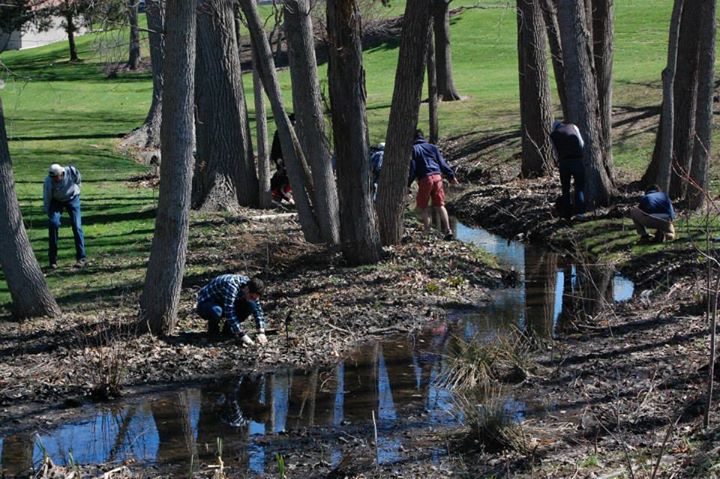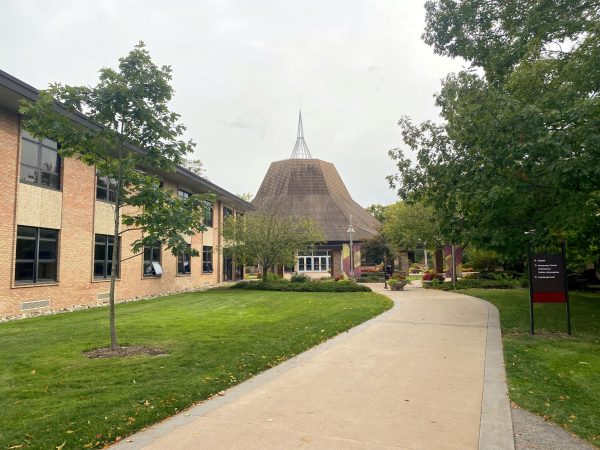Climate change and the church: Calvin on environmental stewardship
Calvin is introducing the Sustainability Fellows in Fall 2023.
Public discussion of climate change this year alone has included an Intergovernmental Panel on Climate Change, President Joe Biden allocating an environmental sustainability policy agenda and the UN COP26 summit on climate change. Early effects of climate change are commencing, according to conclusions drawn from these events, and the earth is undergoing what has been deemed an environmental crisis. The church’s response is not to stay silent. According to biology professor David Koetje, creation care is one of the original commands from God.
“I turn to Genesis 2, where God has created Adam, and tells him to tend to the garden, to keep it … and I hear God talking to me in that passage,” Koetje said.
The impacts of climate change are actually in the news right now, in a way that is putting it more broadly in the national conscience.
Similarly, Pastor Mary Hulst defended the Bible’s position on creation care. “Stewardship is caretaking on behalf of another. We are caretakers on behalf of God,” Hulst said.
This year, an environmental literature class is being taught by English professor Debra Rienstra. In it, Rienstra teaches how our call to love as Christians is associated with our call to stewardship. “If we claim to care about what God loves, which is the entire creation, including people, but not only people, then we have our work cut out for us,” Rienstra said.
The public dialogue of environmental stewardship has made the topic rest on a more national conscience, according to professor and Ecosystem Preserve Director James Skillen: “The impacts of climate change are actually in the news right now, in a way that is putting it more broadly in the national conscience.”
According to Hulst, one reason Christians resist creation care is a misled eschatology, rooted in the notion that the earth will be remade, instead of renewed. “If you believe that the world is going to be destroyed when Jesus returns, then you’re like ‘well, what does it matter that the weather is getting worse?’” Hulst said.
This eschatological misstep often ignores the immediate, physical effects of climate change globally.
Resistance to climate action is often strongest among conservative bases, which according to Skillen is partially tied to disputes between environmental activists and conservative Christians in the ‘60s and ‘70s over population control. This means that the political voices closest to the church are often in contention with environmental activism.
“What makes me really sad is that the politicization seems to be the strongest amongst people who call themselves evangelical,” Koetje said. Koetje noted that the stark disparity between discussions of stewardship and the strongest political influences in evangelicalism creates an obvious and discouraging hypocrisy to observers of the church, damaging the church’s witness.
I think we’re like hydrogen bonds. Collectively is where we have our power.
This is not to say that all Christian communities are remaining silent on environmental issues. Several local congregations, such as Church of the Servant, held prayer vigils this weekend to specifically acknowledge climate change. On Saturday night, Calvin students gathered in the Chapel Undercroft for Light a Candle for Climate Change. The purpose was to light candles and to gather virtually with Christians around the world.
The greatest source of environmental damage is greenhouse gas emissions from corporate businesses, according to the Environmental Protection Agency. The large and systemic nature of climate damage can dissuade individuals from adopting personal changes in practice.
Hulst believed that we should act regardless of its overall effectiveness: “People make up larger systems. And as a follower of Jesus, I don’t get to opt out.” She described her personal decisions to hinder climate change as an act of obedience to God and a way to love her neighbor. She also emphasized the importance of individual actions and how their effects grow over time, even if they seem small in the beginning. She encouraged Christians to begin their work at their local churches.
Professor Koetje responded to those who are resistant to personal action out of concerns for its effectiveness by referring to a plaque mounted outside DeVries Hall, containing the poem “Ode to a Hydrogen Bond.” “I think we’re like hydrogen bonds. Collectively is where we have our power.”









